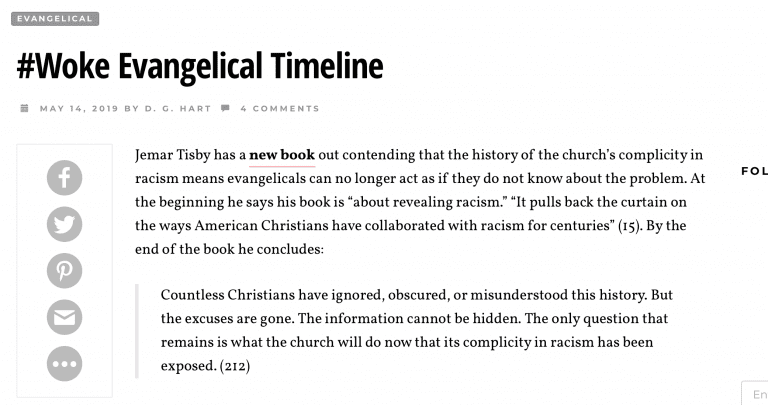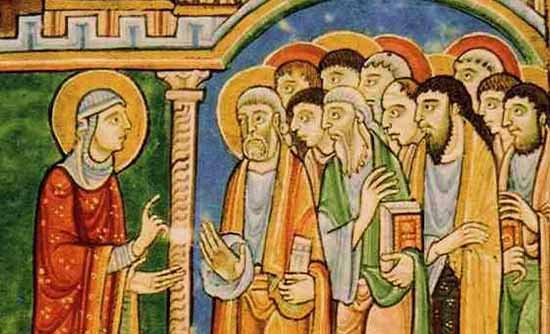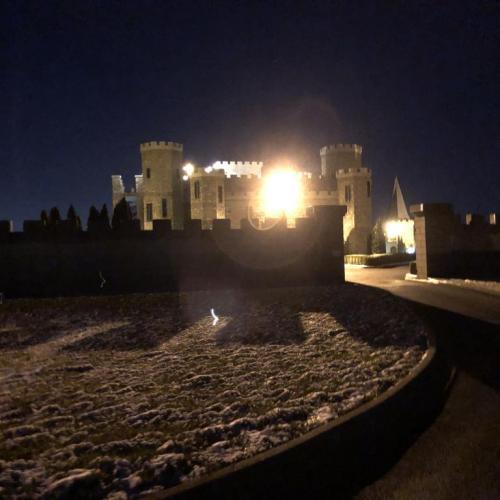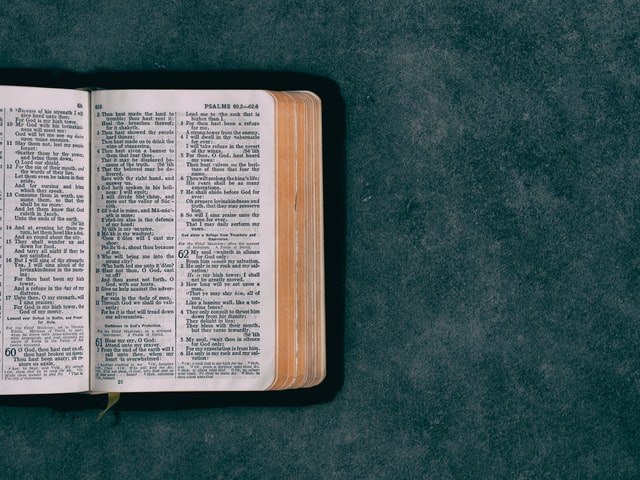A Response to “#Woke Evangelical Timeline”
Today we are so pleased to welcome Otis Pickett, an Assistant Professor of History at Mississippi College, to the Anxious Bench. Otis is also co-founder of the Prison to College Pipeline program.
I recently came across a piece on Patheos by D.G. Hart entitled “#Woke Evangelical Timeline.” While I have tremendous respect for Hart as a historian, I also have relationships with the individuals mentioned in the piece and on Twitter. I have also taken both a personal and professional interest in reading, thinking, and researching about race and the church.

I appreciated Thomas Kidd’s recent exhortation that it is better to contact fellow Christians with whom we disagree directly rather than rashly “call them out” on social media. In that spirit, I reached out to Hart, who was gracious in what proved to be a very civil and constructive conversation. I now better understand Hart’s position and shared that I was working on a response. As an aside, I concur with Kidd that Christians have a responsibility to model public conversations characterized by grace, charity and mutual respect. I think all Christians need to ask themselves “what does it look like to love my neighbor on social media?” and “what makes a Christian’s presence on social media different?”
There are two modest critiques that I would like to raise with Hart’s piece. The first is that he seems to insinuate that Bradley and Tisby were surprised at the levels of racism in American church history. The second is that he seems to be setting a timeline for discussions on race, letting African Americans know that white evangelicals aren’t really that far behind.
Hart’s first point seems to imply that Bradley and Tisby were unaware or at least comfortable with white evangelical circles, but now they have “seen the light” on racism in these circles. As if Bradley and Tisby were not aware of racism or the effects of being in a minority position when they were students, staff and professionals in these circles from the nineties to today?
And yet, these folks seem to have been surprised by the levels of racism in American church history, even as they are now surprised at how few white evangelicals seem to be aware of the problem.
I cannot speak directly for Bradley or Tisby, but I have witnessed some of their experiences from close proximity and I think I can suggest confidently to any reader that both Bradley and Tisby were well aware of racism in the denominations they were a part of. However, I think they were willing to make sacrifices along cultural, ethnic and even theological lines. They were willing to lay down their own preferences, sense of community and comfort to take white evangelical brothers and sisters at their word (that they really wanted change). They were even willing to play central roles in helping those denominations transition out of a largely homogenous ethnic makeup and into a more diverse body greater reflecting American society.
Yet Bradley and Tisby eventually found themselves outside or at least not welcome in the same denominational circles where they had once found reception. Further, this isolation came as a result of challenges to cultural and political “sacred cows.” These critiques, not questions of theology, are often what drew the most ire. It turns out that people who consider themselves theologically orthodox, confessional and fully biblical, also hold cultural and political idols.
I also think it is fair to suggest that the historical training of theologians, pastors and congregations often did not include, at least from 1990-2010, information about church history and its complicity in structural racism. Nor were the works of denominational “heroes” highlighting their racist beliefs. Instead, curriculum focused on the importance of history as it drove theological accuracy and tended to downplay the involvement of denominational leaders in supporting slavery, racial segregation or resistance to interracial marriage. Indeed, it has only been in the last decade that denominations have actively been repenting of racism, investigating racism at their academic institutions/churches, writing books about their denomination’s participation in maintaining the racial status quo and speaking openly about these matters. Further, these materials have only recently been utilized in classroom learning. Very few, if any, of these materials were even present, much less used, in curriculum for training pastors and theologians in the time period Hart references.
Next, Hart noted, “To be sure, white evangelicals need to get up to speed on race relations. But they may not be all that far behind their African-American fellow believers.” I think we need to be very careful, especially as white men in evangelicalism, when we begin to presume to understand a minority person’s experiences and downplay their trauma.
I would say that we just outright not do this at all.
What we need to do is realize that these brothers have been through some really damaging, difficult, disappointing and hurtful trauma. Trauma that has come from their very own spiritual family that they trusted. It is one thing when this comes from the world. That is expected. It is quite another when it comes from within your own tribe. When you are in the midst of that trauma, saying things like “what about your own racism” and “you really aren’t that far ahead of us” isn’t helpful and is incredibly hard to receive when you are still in the midst of ongoing pain, neglect and trauma.

A few years ago my wife gave birth to a pre-mature baby girl. She was just over a pound when she was born. The doctors knew that she would not live and, sometimes very gently and other times not so gently, told us that she was going to die. We didn’t believe it. We couldn’t. Our girl was a fighter and she was going to make it. After almost a year and a half, after lots of fighting and many happy moments, she went home to glory. The doctors were right. Her lungs couldn’t sustain her body as she was growing and her body just gave out. However, there was no amount of “hey, we suffered also in the loss of our child” or “our child was also in the NICU” and “everything is going to work out according to God’s will” or “your child simply isn’t going to make it due to laws of biology” that we could hear from friends or doctors at the time. We just needed our family to walk with us, care for us, pray with us, lament with us, weep with us, mourn with us, hear us, tell us our experiences mattered, that they were real and that our daughter’s life mattered.
I am afraid that we, as a Christian family, have largely failed to come alongside and care well for our African American brothers and sisters in the last several years.
We are quick to point out “you need to move past this,” or “are we still talking about this” and “you are just angry.” We often try to set the timetable of someone else’s pain and when they should move beyond it. Yet we don’t do the hard work of coming alongside our brothers and sisters in the midst of trauma, sitting in it with them, walking with them, and helping them bear the burden.
As Christians, we don’t have the right to set the timeline of another’s pain. Our neighbor is the one who sets it. This is the way of Christ. If it’s a mile. Then it’s a mile. If it’s two, then we walk two. We walk alongside as long or as much as we need to. As Ligon Duncan has said (I am paraphrasing), “I trust that our African American brothers and sisters will let us know when it is time to stop and have a different conversation.” If not then lets continue to walk in good faith, with gentleness and respect.
I find it strange that Hart, even after our conversation, has continued to mention Tisby and Bradley on Twitter multiple times in the month of May and Bradley has clearly noted this. This kind of interaction, I think, does little to accomplish whatever goals one has and only adds to the cacophony voices on Twitter, which is a space that doesn’t lend itself well to a nuanced and complex discussion of these matters. As Bradley has noted, this could be cleared up easily in a phone call or email.





